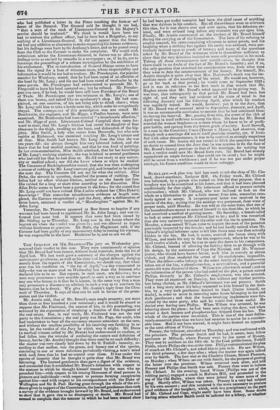Mr. Austin said, that of Mr. Brand's once ample property,
not more than three or four hundred a year remained ; and it would be absurd to suppose that Mr. Fitzbrand, the nearest of kin, in this proceeding, was actuated by the expectation of obtaining a fraction of this fragment of the real estate. But, in real truth, Mr. Fitzbrand was not the real party to this Commission ; the real party was Mr. Page, the uncle, who bad undertaken to bear all the enormous expense attendant on the case, and without the. smallest possibility of his receiving one farthing in re- turn, let the verdict of the Jury be which way it might. Mr. Dunn (a medical witness called by Mr. Brand) had endeavoured to confuse, or had fallen into the mistake of confusing the nature and definition of lunacy, but he (Mr. Austin) thought that there need be no such difficulty: the matter was very clearly laid down by Sir G. Tuthill : insanity, ac- cording to that author, was the genus, and lunacy one of the species, consisting in one or more delusions periodically visiting. man's mind with such force that he had no control over them. It was under this species of insanity that' he thought it quite clear that Mr. Brand was labouring. The learned gentleman then gave a digest of the eyidence, and contended that it established Mr. Brand's delusions with respect to the manner in which he thought himself treated by the men who ap- proached him—with respect to his tracing likenesses of dead persons in pictures and individuals—with respect to persons forming conspiracies against him—and with respect to his correspondence with the Duke of Wellington and Sir R. Peel. Having gone through the whole of the evi- dence given in support of the Commission, the learned gentleman then took a survey of the evidence brought forward by Mr. Brand, and endeavoured to show that it gave rise to no discrepancy or doubt. Mr. Brand had seemed to complain that the summer in which he had been treated since he had beers put under restraint had been the chief cause of anything that was dubious in his conduct. But all the evidence went to overturn
this idea, for it was shown over and over again, that his delusions ex- isted, and were evinced long before any restraint was put upon him. Finally, Mr. Austin commented on the conduct of Mr. Brand himself
during the carrying on of the Commission. The facts of his refusing to employ counsel, his cross-examining witnesses to minor points, and his laughing when a striking fact against his sanity was adduced, were par- ticularly insisted upon as proofs of lunacy; and many of the questions asked by Mr. Brand of the witnesses were in themselves sufficient to show that the very delusions insisted on were still prevalent in his mind. Taking all these circumstances into consideration, he thought that there could be no doubt of the fact of Mr. Brand's insanity; and if so, the only question that remained for consideration was, from what time they were to date the commencement of his lunacy. For himself, Mr. Austin thought it quite clear that Mrs. Dashwood's death was the im- mediate cause of the unsettling of his mind. He would not, however, go so far back as that period ; he would come to' September 1829;, and it was in reference to the first week in that month that Mr. Hughes swore that Mr. Brand's mind appe4red to be giving way. It was true, that subsequently to that period Mr. Brand had been lost sight of, and they only had evidence of his state of mind in the following January and the following April, after which his conduct was regularly traced. He would, however, put it to the Jury, that if Mr. Brand was of unsound mind in September; January, and April, it was an unreasonable conclusion to assume that lie had continued luna- tic during the interval. But, passing from this, the event of the 11th of April was in itself sufficient to stamp the date. On that day Mr. Brand married the woman Stephens—a woman whom he knew to be of profli- gate habits, and sprung from the lowest grade of society. Lord Stowell, in a case in the Consistory Court (Turner v. Mares), had observed, that though such a marriage did not in itself proclaim insanity, yet, if forti. fled with other circumstances, it was to be received as strongly suspicious of such cause. Mr. Austin did not intend to blink the question—he had no desire to conceal from the Jury that be was anxious to fix the date of Mr. Brand's lunacy previous to that of his marriage, for nothing but such a verdict could save Mr. Brand from ruin. Mr. Brand had already squandered an ample fortune : that could not be saved ; but he might still be saved from a workhouse ; and if he was not put under proper tutelage, his future condition would be most unhappy.


























 Previous page
Previous page